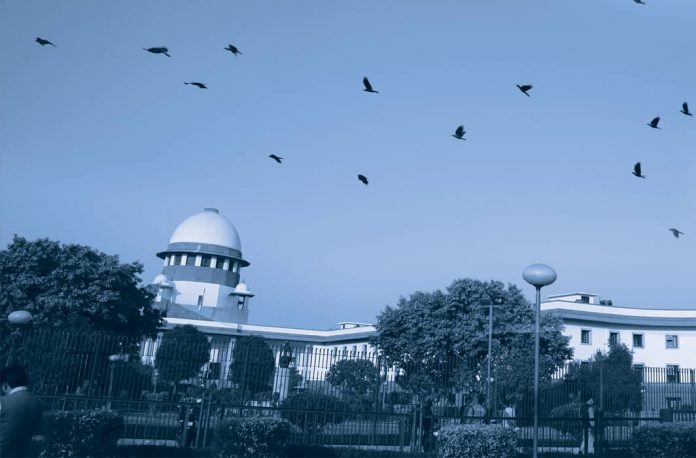The Supreme Court on Wednesday said Article 32 is not an appropriate remedy to set aside an order of the High Court while dismissing a PIL against the order of Allahabad High Court which had held that conversions just for the sake of marriage are invalid.
The Bench dismisses the petition on noting petitioner’s submission that Division Bench of Allahabad HC had already set aside the order in question.
The bench of Chief Justice S. A. Bobde, Justices A. S. Bopanna and V. Ramasubramanian was hearing the PIL filed by Advocate-On-Record (AOR) Aldanish Rein against the order of the Allahabad High Court in case of Priyanshi @Km Shamreen & Ors Vs State of UP & 3 Ors wherein the court had said that conversion just for the purpose of marriage is unacceptable. The matter before the HC was filed by a Muslim woman who changed her religion to marry a Hindu man. She had sought the HC’s direction against the State to not to interfere with their peaceful married life by adopting coercive measures. But the High Court had refused to interfere.
The petitioner had submitted that a “wrong precedent” has been set by the Allahabad High Court by declining police protection to an inter-faith married couple holding that religious conversion for the purpose of marriage was unacceptable.
Today, during the hearing, CJI Bobde asked the petitioner: Can’t you go to the High Court? Article 32 is not an appropriate remedy to set aside an order of the HC. Read the judgment. Justice Krishna Iyer judgment. You can seek approval of the Court to file an SLP when you’re not an affected party.
Rein submitted that in extraordinary circumstances, the Court should declare the order as improper. This order has triggered the State of UP to pass an Ordinance, due to which hundreds of couples have been harassed over the past month, he said.
The petition had stated that the High Court order has not only left the poor couple at the mercy of the offending family members, the police, the vigilantes and the hate monger religious associations but has also laid a wrong precedent that the inter-religious marriages cannot be solemnized at the instance of conversion of religion by either of the partners.
Further it alleged, that above all the Chief Minister of Uttar Pradesh citing the above order of the High Court raised the issue of “love jihad”, and invoked “Ram naam satya” – a Hindu funeral chant, thereby threatening inter-religious couples.
“The states of Uttar Pradesh, Haryana, Madhya Pradesh and Karnataka have already announced to enact a law banning conversion of religion for the purpose of marriage, specifically citing the above order of the Hon’ble High Court of Judicature at Allahabad.
That undoubtedly the couples of interfaith should adopt The Special Marriage Act, 1954 to get married but the cumbersome process and the unreasonable provisions of the Special Marriage Act, 1954 makes it very difficult for a runaway couple to abide by the said provisions resulting in religious marriages after conversion to the faith of either of the partner.
Also Read: Delhi HC seeks responses from Delhi government, municipal bodies over seismic stability of buildings
That the Constitution of India provides for the right to freedom of religion and the same includes that a person has the right to choose and profess any religion or no religion at all. It also includes the right to convert into any religion as many times as one wants to with no tabs. Choice of religion is a personal choice of a person. If the Court does not allow a person to freely choose his religion, it amounts to a violation of his or her fundamental right as guaranteed under the Constitution of India.”


